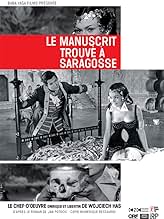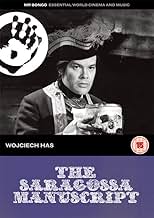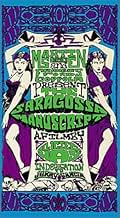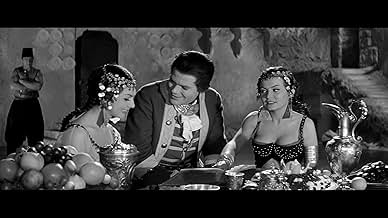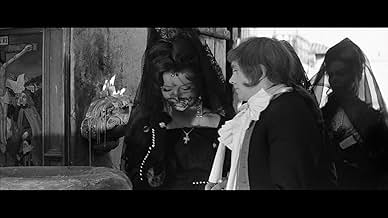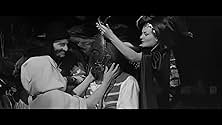Rekopis znaleziony w Saragossie
- 1965
- 3h 2min
Agrega una trama en tu idiomaUpon finding a book that relates his grandfather's story, an officer ventures through Spain meeting a wide array of characters, most of whom have a story of their own to tell.Upon finding a book that relates his grandfather's story, an officer ventures through Spain meeting a wide array of characters, most of whom have a story of their own to tell.Upon finding a book that relates his grandfather's story, an officer ventures through Spain meeting a wide array of characters, most of whom have a story of their own to tell.
- Dirección
- Guionistas
- Elenco
- Premios
- 1 premio ganado en total
- Dirección
- Guionistas
- Todo el elenco y el equipo
- Producción, taquilla y más en IMDbPro
Opiniones destacadas
The task was taken up in 1965 by director Wojciech Has and writer Tadeusz Kwiatkowski, and the results in his original cut ran to over three hours. Seen today, and belatedly issued in the UK, The Saragossa Manuscript is a remarkable discovery, one that any serious cinephile should experience at least once.
The story concerns one Alphonse von Worden (Zbigniew Cybulski - an actor more familiar to some perhaps from Wadja's films like Ashes And Diamonds) and his attempts to travel through the Sierra Morena to Madrid in the 18th century: a milieu redolent, at first, of the dashing bawdry of Tom Jones but which soon blazes a complex metaphysical path of its own. His story is found by a Belgian officer in the embattled Spanish town of Saragossa, in the form of a manuscript with alluring pictures, left in an abandoned house. Von Worden, it turns out was this discoverer's grandfather, it's his thwarted attempts at making progress, and the confusing diversions which interrupt the way, as well as their final effects upon him, that make up the protracted story which follows.
The Saragossa Manuscript falls into to two parts, set over five days, both of which include von Worden (the second half less so) who is frequently just as disorientated as the viewer as the narrative unfolds. The first part centres largely around a haunted inn, where von Worden is seduced by a pair of alluring Moorish princesses, confronted by the demonic ghosts of hanged men, lectured by a hermit and his Igor-like assistant, captured outside by the Inquisition and so on... usually incidents concluding with our unlucky hero disappointed, left to awake next morning chastened but still unlearned at the foot of the gallows.
One of the most interesting things about the film is that, although days are shown passing in regular fashion, von Worden's experiences blur and conflate time into one disorientating experience, so that the passing of hours eventually has no meaning. Instead the audience is confronted with a circular narrative and narratives therein, unfolding like a series of repeatedly opened Russian dolls. How transient life and ambition can be we realise; and how little we really understand about the world we are in, ultimately presented here as a mirror of deception, rather than a veil of truth.
Action in the slightly longer part two settles down a suspiciously cabalistic manor and a vaguely Faustian sanctum, which shortly accommodates story telling gypsies, perhaps those after all to whom the incompetent Inquisition seen earlier ought be better directed. The events told here are more related to love and honour than before, being largely recollections of events in Madrid, but which reach new convolutions as each new character in a yarn has a further account to add to the already swelling narrative flow. Clearly to be seen in the light of the themes of sic transit gloria of the first part, the semi-farcical love trysts of part two seem less weighty and morally significant, although by the end of the film its clear that the effects upon the individual of a final connectiveness cannot be avoided.
As suggested above, The Saragossa Manuscript suggests a lot and at length about what's real and which is a dream, and then of taking life as a necessary mixture of both. The transience of human concerns, and an ultimate, underlying interconnnectedness calls into account the foundations of human reason. Whether or not such topics are given justice, even in the full three hours of screen time, and in a narrative some have seen as more confusing than deeply profound is another matter. As some critics have noticed, there's a sardonic air to Has' movie which detracts from the seriousness of it all, and which allows the film's creators a detachment from their subject matter.
Such a wholly modern interjection of tone is distinct from the original. Cybulski's hero is a man who rarely, if ever, learns the lessons he is so grievously taught, even while they are repeated to him in different ways. This while the semi-farcical, if complicated, love interests of the second part generally reflect a bawdy ignorance of greater matters, rather than insisting upon their inevitable presence. (Interestingly, having said that, this adaptation actually finishes on a darker note than the novel, where von Worden is rewarded at the end, presumably having been successfully initiated into life's mysteries).
But one can see why the film continues to attract admirers; shot in widescreen black and white, frequently making use of a memorably stone-broken, skull-littered, undulating landscape (the uncertain geographies of which echo the manifest internal confusions of von Worden) with bleached bone-coloured rocks, claustrophobic inns and the litter of the charnel house, the first half in particular is especially striking. The director also favours slow tracking movements through his cluttered landscapes. Perhaps these suggest the journey of an objective observer, who eventually hopes to cut through complexity to a revelation, just as the camera crawls through visual confusion to find its final, explicable, subject.
Not for everyone, but probably a great choice if you don't like Chuck Norris too much!
By the end of the film, to say the least, the viewer has been presented with a convincing picture of sixteenth-century Europe from different angles, and it's safe to say that no other film, before or since, in color or Black-and-white, has done it better.
¿Sabías que…?
- TriviaLuis Buñuel, who seldom viewed movies more than once, liked this film so much that he saw it three times.
- Citas
Donna Rebecca Uzeda: All these adventures begin simply. The listener thinks it'll soon be over, but one story creates another, and then another.
Don Pedro Velasquez: Something like quotients which can be divided infinitely.
- Versiones alternativasOriginally released in a cut version in the US, the film was restored to it's original 182-minutes running time and premiered at the New York Film Festival in September 1997. The restoration project, supervised by Edith Kramer, was initially sponsored by Grateful Dead's leader Jerry Garcia and later completed by Francis Ford Coppola and Martin Scorsese. The restored version includes a dedication to Jerry Garcia.
- ConexionesFeatured in Aktorka (2015)
Selecciones populares
- How long is The Saragossa Manuscript?Con tecnología de Alexa
Detalles
- Fecha de lanzamiento
- País de origen
- Sitio oficial
- Idioma
- También se conoce como
- The Saragossa Manuscript
- Locaciones de filmación
- Olsztyn, Slaskie, Polonia(castle)
- Productora
- Ver más créditos de la compañía en IMDbPro
Taquilla
- Total a nivel mundial
- USD 13,377
- Tiempo de ejecución3 horas 2 minutos
- Color
- Mezcla de sonido
- Relación de aspecto
- 2.35 : 1
Contribuir a esta página


